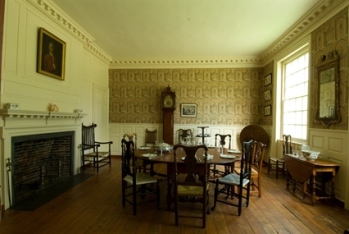Johnson Hall State Historic Site

139 Hall Avenue
Johnstown, NY 12095

Differing cultures, traditions and languages combined to create a unique life for the Johnson family, with the Hall bustling with activity as home life and business life intermingled daily. Visitors included members and representatives of various Native Nations and tribes, sometimes numbering in the hundreds at Council gatherings. The home was the centerpiece of a 700-acre working estate, with elaborate formal gardens, vegetable plots, orchards, a mill, blacksmith shop, Indian trade store, barns, enslaved and tenant housing, and other support buildings.
Following the death of Sir William in 1774, Molly and her children left Johnson Hall, and his eldest son John inherited both the property and title of Baronet. By 1776, the new Revolutionary government forced this Loyalist family and many of their supporters to flee to Canada under threat of imprisonment and violence. Johnson Hall was seized and looted, with most of its remaining contents subsequently sold at auction following the war. Johnson Hall remained a private residence through 1906, when it was acquired by the State of New York and opened to the public as a State Historic Site. Today, Johnson Hall continues to welcome visitors and interpret the site's colonial history through guided tours, on-site and outreach educational programs, and special events.
Hours of Operation
- 2025 Season: May 24 through October 12
Guided Tours of The Hall
Guided tours will be given on the hour Wednesdays through Saturday between 10am to 4pm (final tour begins at 3pm) and Sunday between 1pm and 4pm (final tour begins at 3pm). Special events may alter this schedule. To ensure tour date availability you may contact site staff during normal business hour at (518) 762-8712.The grounds are open to the public from sunrise to sunset.
Fees & Rates
- Admission
Fees and Rates for Guided Tours
Adults: $7.00
Senior Citizens: $6.00
Children 12 and under: FREE
Group Rate (advance reservation required): $6.00 per person /$20 minimum
School Groups (advance reservation required): FREE for 2025
Maps
Saturday, October 25, 2025 06:30 PM - 07:30 PM
Johnson Hall State Historic Site
Amenities Information
- Amenities
- Gift Shop (Accessible)
- Picnic Area (Accessible)
- Tours
- Visitor Center (Accessible)
